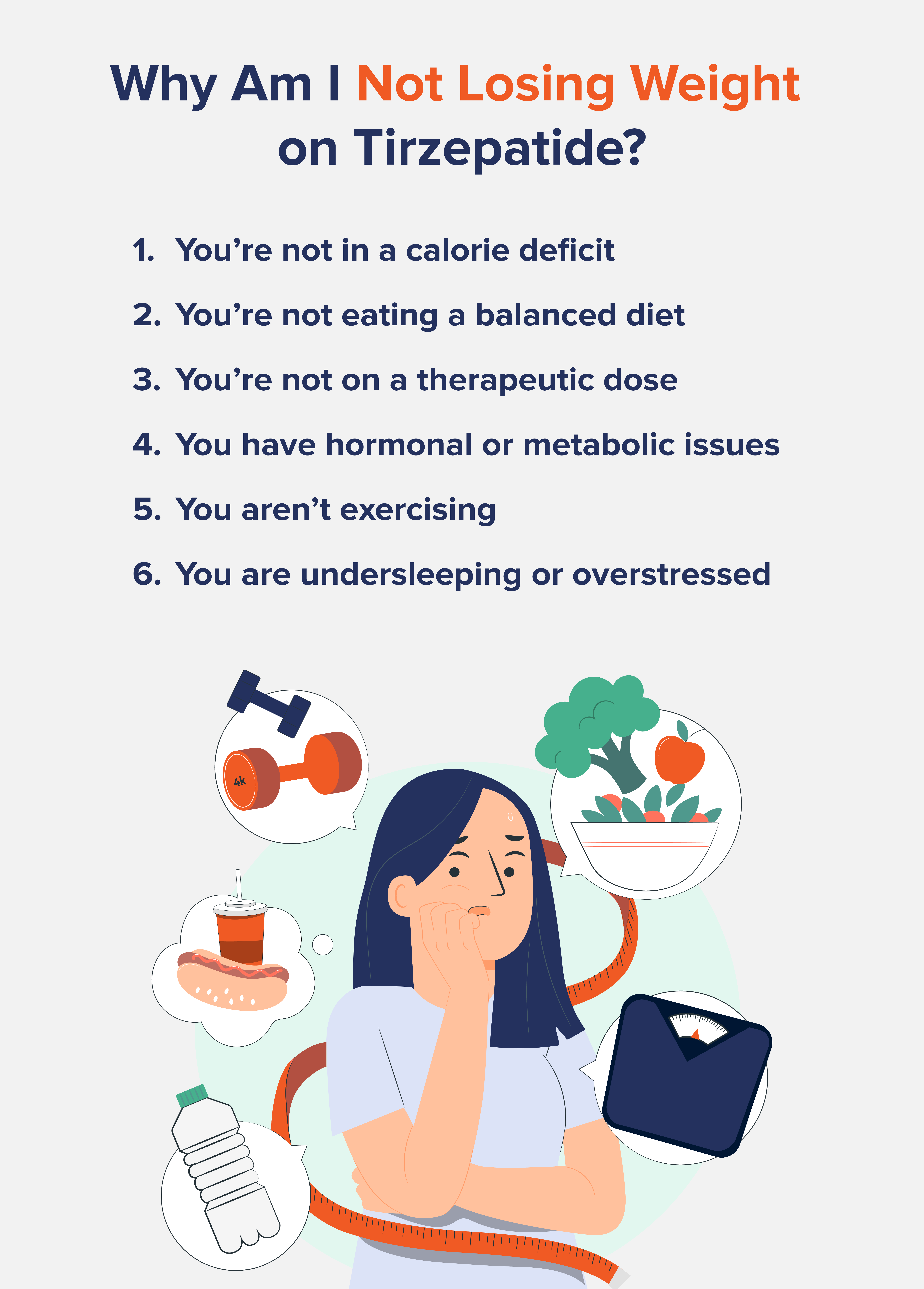Save $40 on your initial consult with a TNI Dietitian!
Talk to a real Dietitian for only $99: Schedule Now
Evidence Based Research To fulfill our commitment to bringing our audience accurate and insightful content, our expert writers and medical reviewers rely on carefully curated research.
Read Our Editorial Policy
Are you taking tirzepatide but not losing weight? You’re not the only one.
Marketed under the brand names Mounjaro or Zepbound, Tirzepatide addresses multiple aspects of metabolism, appetite regulation, and blood sugar control, helping millions of people lose weight.
However, the reality of weight loss is rarely that simple. Several factors could prevent tirzepatide from working as effectively as expected—and this article will explore the top six reasons and how to troubleshoot them.

First and foremost, you need to be in a caloric deficit to lose weight—the laws of thermodynamics don’t bend even when you’re on a weight loss medication.
The quality of the food we eat matters for metabolic health, hunger levels, energy, and much more. But when it comes to fat loss, you must eat fewer calories than you burn.
Although tirzepatide reduces appetite, that doesn’t guarantee a calorie deficit.
Small habits (like flavored lattes, bites of your kid’s lunch, and alcohol) can really add up.
Plus, your calorie needs may be lower than you expect, especially if you’ve lost some weight already or have a more sedentary lifestyle.
What to do: Try logging your food (including snacks, beverages, and “little bites”) for a few days on a tracking app to get a baseline of how many calories you’re consuming.
If you’re unsure how many calories you should eat, consider meeting with a TNI Registered Dietitian (RD) to get a personalized nutrition plan.
The quality of the food you eat and the macronutrient ratios matter for weight loss—and for feeling your best.
Even if you’re technically in a calorie deficit, a diet high in refined carbs and sugar can sabotage your results, leading to increased cravings, fatigue, and even muscle loss, which in turn slows your metabolism.
Protein is essential for weight loss, as it helps preserve lean muscle, which helps keep your metabolism from slowing down, and keeps you feeling fuller for longer.
Fiber is also important, as it boosts satiety, supports gut health, stabilizes blood sugar levels, and helps manage cravings.
What to do: Aim for your meals to include protein sources like chicken, eggs, or tofu, healthy fats such as avocado or olive oil, and fiber-rich foods like vegetables, beans, and whole grains.
A good start is about 30 grams of protein per meal and 25-35g of fiber per day.
For more tailored goals, an RD can help you create a plan that aligns with your body’s needs and your medication.
Get a science-backed calorie & macro plan to lose weight sustainably, built for your life.
Get a science-backed calorie & macro plan to lose weight sustainably, built for your life.

Tirzepatide has a specific dosing schedule designed to minimize side effects, like nausea.
This means you may not be on a high enough dose yet to experience its full appetite-suppressing effects.
Many people start at a low dose (like 2.5mg) and slowly work their way up to a therapeutic level, which might be between 10-15mg per week.
If you’re still early in your treatment or haven’t increased your dose yet, be patient—slow or nonexistent weight loss is common at first.
What to Do: Check in with your doctor about your current dose and timeline for increasing it.
If you’re still not seeing significant changes after several weeks, you may be a candidate for a dose adjustment.
That said, be sure to also focus on nutrition and lifestyle changes to complement the medication and maximize your progress.
Unfortunately, while you may be doing everything right with nutrition and exercise, an underlying hormonal or metabolic condition can make losing weight much more challenging.
Conditions like PCOS (polycystic ovarian syndrome), Cushing’s syndrome, hypothyroidism, and insulin resistance can significantly impact your metabolism and make weight loss much more complicated.
For example, hypothyroidism can slow your metabolism, while insulin resistance can lead to fat storage and increased hunger.
These underlying factors can make it harder to stay in a calorie deficit or maintain muscle mass.
What to do: Speak with your doctor if you’re concerned that you have potential hormonal or metabolic issues.
If you have already been diagnosed, effective management—whether through medication, diet, or lifestyle changes—can help tirzepatide work more effectively in your weight loss journey.
“Calories out” is just as important as “calories in” when it comes to weight loss—and that’s where moving your body comes in.
Although you don’t have to hit the gym for hours each day (nor should you), daily activity is essential for weight loss—even if it’s just walking around the neighborhood.
Regular exercise helps regulate hunger hormones, builds muscle, improves sleep and mood, and boosts your energy levels, all of which can improve weight loss.
Strength training is also crucial when using weight loss medications to prevent the common loss of lean body mass.
What to do: Aim for movement every day. A good weekly goal is to aim for 2-3 strength training sessions and 150 minutes or more of moderate-intensity cardiovascular activity, such as brisk walking or jogging.
Lifestyle factors, such as sleep and stress, play a much greater role in weight loss than you may think.
Inadequate sleep can interfere with your hunger hormones, increasing cravings for unhealthy foods.
Chronic stress, on the other hand, can increase cortisol levels, which may lead to fat being stored around your abdomen.
Both can sabotage your progress and make it harder to stay in a calorie deficit.
What to do: Aim for 7-9 hours of high-quality sleep per night by having a calming bedtime routine, reducing screen time before bed, or considering a sleep supplement.
Manage stress with meditation, deep breathing, exercise, or journaling.
Tirzepatide is a type of medication known as a GLP-1 receptor agonist, similar to semaglutide, also known as Ozempic.
However, tirzepatide is also a GIP receptor agonist, while Ozempic is not.
GLP-1 and GIP are hormones naturally produced in the gut that help regulate appetite, metabolism, and blood sugar levels.
By stimulating the GLP-1 and GIP receptors in the brain, tripeptide reduces hunger and enhances feelings of fullness, making it easier to eat less without constantly feeling hungry.
It also helps with metabolic health by regulating blood sugar and improving insulin sensitivity, which is highly beneficial for people with type 2 diabetes.
Lastly, tirzepatide is also thought to work by slowing gastric emptying (the speed at which food moves through the digestive tract), causing you to feel fuller from your meals.
An RD can be a valuable resource for your weight loss journey.
While tirzepatide can reduce appetite and help regulate blood sugar, an RD can help you make the most of the medication by guiding you on proper nutrition, meal planning, and lifestyle changes that amplify your success.
A Registered Dietitian can help you lose weight by:
Book an appointment with an RD at The Nutrition Insider to jumpstart your weight loss journey today!
No, they are different.
While tirzepatide and semaglutide are both GLP-1 receptor agonists that help with weight loss by regulating appetite and blood sugar, tirzepatide has an additional action as a GIP receptor agonist, which means it targets another hormone involved in metabolism and insulin regulation.
This dual mechanism may make tirzepatide more effective for some people.
No, dietitians cannot prescribe tirzepatide (or any other medications).
Only a healthcare provider, such as a doctor or nurse practitioner, can prescribe medications like tirzepatide.
However, an RD can play a key role in helping you understand how to use the medication combined with a healthy diet and lifestyle to maximize its benefits.
Tirzepatide works for weight loss mainly by reducing appetite, but it also improves insulin sensitivity and slows gastric emptying, making you feel fuller after meals.
Yes, tirzepatide is known to have side effects—most of which are gastrointestinal.
The most common side effects of tirzepatide are:
– Nausea (especially when first starting)
– Vomiting
– Diarrhea
– Constipation
– Indigestion
– Stomach pain
– Dehydration
– Headaches
– Dizziness
– Fatigure
It also causes appetite loss—which is the point—but can sometimes become too extreme, making it difficult to maintain adequate caloric intake.
Some serious but rare side effects include pancreatitis, kidney problems, thyroid tumors (seen in animal studies), or allergic reactions.
Results can vary widely, but many people start to see weight loss within the first 4-6 weeks of consistent use.
However, it’s important to remember that tirzepatide works best when combined with healthy lifestyle habits, including a balanced diet and regular exercise.
In clinical studies, some people who used tirzepatide for weight loss lost between 15%-21% of their body weight.
However, individual results can vary significantly based on factors such as adherence to diet and exercise, metabolism, and genetics.
For lasting weight loss, a combination of medication and consistent healthy lifestyle changes is key.